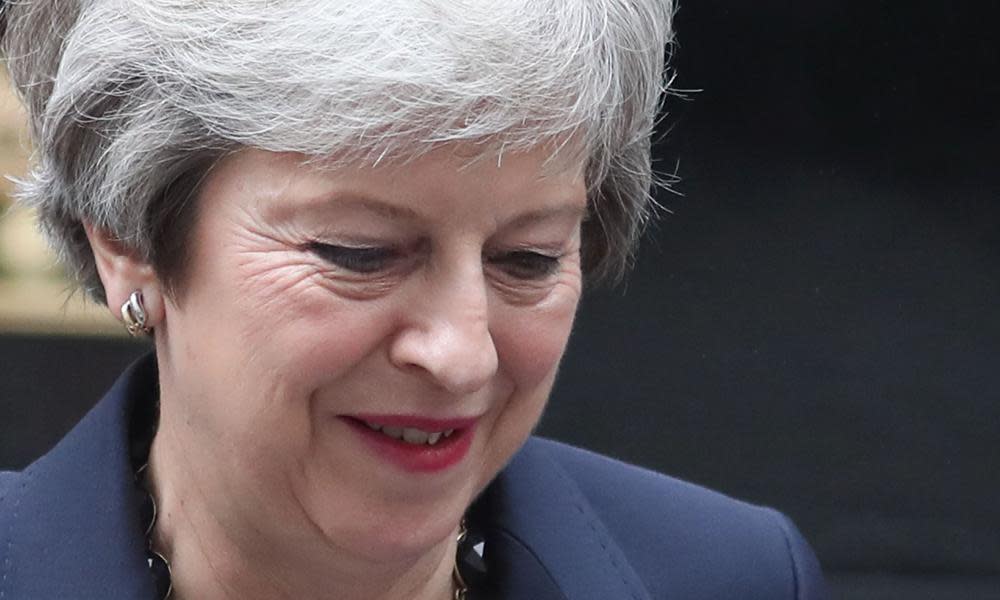Stormy cabinet meeting increases pressure on May over backstop

Theresa May has presided over a stormy meeting of her cabinet at which several ministers insisted she negotiate with the EU a time limit to any Brexit backstop, intensifying the pressure on her to obtain a divorce deal she can sell to her own party.
No 10 sources conceded that the discussion, which came a day before the prime minister was due to plead for support from Tory MPs at a meeting of the party’s 1922 committee, was “impassioned”. Others characterised it as a row.
A group of ministers, including Jeremy Hunt, the foreign secretary; Liz Truss, the chief secretary to the Treasury; and Michael Gove, the agriculture secretary, were among half a dozen who emphasised their concern over imposing a time limit on any backstop, which is designed to avoid a hard border in Northern Ireland.
But another group of ministers disagreed, and appeared to argue that May should concede over the backstop – an insurance policy sought by Ireland in case a long-term free trade deal cannot be agreed – because the EU would not accept a time limit.
David Lidington, the Cabinet Office minister, said that he was terrified at the idea of a no-deal Brexit, which he said would be as serious as Black Wednesday – when the pound crashed out of the Exchange Rate Mechanism leaving the Tories’ reputation for economic competence shredded for 15 years.
Lidington told colleagues that he was concerned that the European Union would not agree a divorce deal without an indefinite backstop, and that the prime minister needed to accept that and negotiate on that basis in order to avoid the high-risk, no-deal scenario that he had warned about.
Others including Greg Clark, the business secretary, and David Gauke, the justice secretary, raised similar concerns to Lidington.
One source present also said that Sajid Javid, the home secretary, “visibly annoyed” May when he complained about how the idea of extending the post-Brexit transition period last week had been presented – although Downing Street denied this was the case.
May and other ministers close to the talks had initially said last week that the idea of extending the transition – in which the UK would remain in the customs union and single market until the end of 2020 – was suggested by EU leaders over dinner.
The proposal was warmly received and touted by May and others as a potential alternative to the backstop, although hard Brexiters complained that it could cost the UK billions more in EU contributions for staying in during 2021.
The cabinet meeting had been supposed to end shortly after 11am but the meeting overran until closer to noon, because of the unruly discussion about Brexit. Senior ministers have been complaining that they have been kept in the dark about the detail of the negotiations and have been pressing for May to keep them more closely in the loop.
Shortly after the tense meeting, No 10 confirmed that May was going to speak to the Conservatives’ backbench 1922 committee early on Wednesday evening, after yet another day of speculation about whether there would be a challenge to her leadership.
Rumours briefly circulated that 48 letters demanding a contest had been sent to Graham Brady, the chairman of the 1922 committee, enough to force a vote of no confidence. Brady swiftly indicated that was not the case, telling friends he intended to go about his business as usual and had no plans to be in contact with No 10.
Lurid, anonymous briefings at the weekend which had described May as entering “the killing zone” and needing to “bring her own noose” if she went to the 1922 committee meeting appear to have strengthened support for her. Andrew Mitchell, a former chief whip, who is close to former Brexit secretary David Davis, said a challenge to May at this point would be a mistake.
British officials working on the Brexit talks are putting together a proposal on how the exit mechanism could work for Brussels to consider, although concerns have been repeatedly raised in Brussels and Dublin that a backstop that was not indefinite would not amount to an adequate border insurance policy.
A backstop is deemed necessary to prevent a hard border re-emerging in case the UK and EU are not able to conclude a free trade deal. The UK is proposing that the whole country would remain in a “temporary customs arrangement” after the transition period ends in 2021.
The EU is evaluating whether it could be an acceptable alternative to the Northern Ireland-only backstop that it has proposed, under which the region would remain in the customs union and single market, but which May has repeatedly denounced as unacceptable.
Irish broadcaster RTE reported that the EU is ready to agree the UK-wide backstop, but only as part of a separate treaty that would follow the withdrawal agreement agreed as part of the article 50 exit talks, that would still include a backstop applying to Northern Ireland only.
The idea of a Northern Ireland-only backstop has been repeatedly rejected by May and Downing Street: “The prospect of Northern Ireland being placed in a different customs arrangement to the rest of the UK is unacceptable.”
May also told colleagues that Donald Tusk, the president of the European council, had advised her that the other members of the union stood ready to hold an emergency summit to finalise a Brexit deal if officials were able to reach an agreement in principle.

 Yahoo News
Yahoo News 
